Finalist, 2019 Golden Crown Literary
Society Awards – General Fiction
The Heart Begins Here is the story of the ever-optimistic, earnest Sara Requier and her disintegrating seven-year relationship with the cynical Wanda Wysoka. Along with her relationship struggles, Sara must contend with the drastic changes in the book industry that threaten her feminist bookstore, as well as a mother who refuses to accept her daughter’s lesbianism. Then, just as Wanda decides to leave Sara, Wanda’s new young lover, Cindy, is murdered. The story takes place in a western Canadian city in 2001 — much of it in Sara’s bookstore, Common Reader Books — in the shadow of the disturbing political climate that followed the 9/11 attacks in the U.S. This is a transitional point in the Canadian book industry: the proliferation of big box stores, the expansion of the Internet — and Sara is caught up in the concomitant changes in her community. The book explores themes of love and loss, of the lingering effects of a dysfunctional childhood, of misogyny, of personal and societal homophobia, and especially the challenge of integrating the personal with the political.
“The Heart Begins Here is a delightful read that made me both think and laugh out loud. Sara’s feminist bookstore is failing and her long-time lover is cheating. Dumas brings all of Sara’s difficulties to life in incisive and often satirical prose. She skewers disastrous poetry readings and lesbian hangouts, but her true targets are cruelty, misogyny, and homophobia. As the title promises, the novel offers wisdom as well as humour, and pain as well as love.”—Caterina Edwards, author of The Sicilian Wife and Finding Rosa
“The Heart Begins Here is a novel for these times, exploring issues that many of us ponder regularly: the impacts of international conflict on individual lives; the effects of digital technology on how we create and access books and other forms of culture; the challenges of navigating the world as who we are, rather than as who others think we are – or who we ought to be. This is a novel about beginnings, changes, endings – of relationships, of business ventures – and about how the knowledge we gain as we progress (often unwillingly) through these cycles is essential to our ability to move forward. By turns poignant and laugh-out-loud funny, Jacqueline Dumas’s new novel deftly keeps us turning pages, as much for the pleasure of reading her writing as from our keen interest in discovering what will happen next. ”
—Mary W. Walters, author of The Woman Upstairs, Rits Just Wants to Be Thin, and Cool
Jacqueline Dumas is a writer and educator who lives in Nova Scotia. She was a long-time resident of Edmonton, Alberta, where she ran Aspen Books (1977-1985) and latterly Orlando Books (1993-2002), a progressive, feminist bookstore that promoted countless writers from across the country. Her published works include: Madeleine & the Angel (1989), winner of the 1989 Georges Bugnet Award for Best Alberta novel, and a finalist for the 1989 Books in Canada/W.H. Smith Best First Novel Award; The Last Sigh (1993); a children’s picture book, And I’m Never Coming Back (1986); and a one-act play, Secrets, which was produced at the 2013 Edmonton International Fringe Festival. In 2012, she edited an anthology of work by second language writers, Writing in the Margins (Writers Beyond Borders). Her community involvement and commitment has earned her various awards, including awards for service to the Gay and Lesbian communities and the YWCA Woman of Distinction for the Arts.
Just as Peach’s reading was coming to an end, Wanda pushed me aside and reached out—the poet in the oversized coat was lowering himself onto a corner of the card table—but she was too late. He crashed to the floor with the table beneath him, spraying his entourage, the floor, and the surrounding bookshelves with gobs of cheese and wine-soaked crackers and what was left of Wanda’s cup of white wine.
That was it, the final straw. Wanda shouted at everyone to leave. “Folks, thank you very much! This evening has come to an end.”
She held the door open as she ushered them out. “Thank you, thank you for coming.”
As the confused crowd filed out, Fang stood at the door handing out his sheets of poems.
Wanda’s sales projection had been dead-on. Although some fifty people had squeezed into the bookstore that night, I managed to sell two books, both mass-market paperbacks, for a total of $16.98.
Over the next months, and after another couple of uninspired events, I did my best to read the works of prospective authors in advance, thus ascertaining which ones suited the mandate of the bookstore. By then, Wanda had stopped arriving early to help me set up. She would show up just in time for the reading and sometimes help clean up after the customers had left.
I became wary of travelling out-of-town writers. Local writers could draw their friends and relatives to an event, but few customers would sacrifice a cozy winter’s evening before the fire or a long, cool summer’s evening in the river valley to come out for an author they’d never heard of writing about things they didn’t care about.
When one of these out-of-towners called, the tone tended to be deceptively casual: “I just happen to be passing through, but I could make time to stop by your store and do a reading”—as if a favour were being bestowed upon me. The author would then claim to have dozens of close friends and relatives, who for mysterious reasons failed to materialize on the actual night of the reading.
In an attempt to forestall hurt feelings, I would try to explain away the poor turnout as anything but lack of interest, weather being the default excuse. It was too miserable out, or it was too beautiful. “You can’t get anyone to budge after it snows,” I’d say, or “The summers are so short here that everyone is out getting a bit of sun.” Or I’d blame the long weekend, the hockey game, a popular play, or the ballet that had fallen on the same night, even the symphony. Once I even cited a Cutest Pet Contest. I blamed the lack of interest on anything other than the fact that most people in our city of almost one million would rather watch reruns of Perry Mason than attend an evening of rhymed poetry.
Not that there was anything wrong with rhymed poetry. But I had learned my lesson.
***
3.
Within the first year of opening my doors, my vision of a store that promoted women’s writing expanded to include books on progressive politics, books for gay men, and a carefully chosen selection of children’s books. Once I was focused on the books I believed in, the store blossomed, both creatively and socially, and for its first few years, it became the supportive and safe space that Wanda had envisioned. As a bonus, the community I had been searching for without knowing, found me. Soon customers were pitching in to help organize readings and other events. Every December 6, we held a special ceremony to remember the fourteen women murdered at the École Polytechnique in Montreal in 1989. One evening, we held a Women of the Left Bank gathering to which customers came dressed as their favourite writers from pre-war Paris. Djuna Barnes showed up, as did Janet Flanner and Natalie Barney. Two Gertrude-Stein-Alice-B.-Toklas couples came, as well as one James Joyce in drag. Wanda and I appeared as Adrienne Monnier and Sylvia Beach. Each “writer” read from her own work. For the first time since I had given up my teaching job, going to work had become both fun and meaningful.
However, things had already begun to change in the book industry. Big publishers were increasingly gobbling up smaller ones, retail chains were expanding, and more and more people were buying their books off the Internet. And as the store approached its seven-year mark, I started to worry in earnest about its future.
About the same time as I started to worry about the store, I began to notice changes in Wanda’s behaviour. I should have paid more attention to the signs.
The first sign occurred on Valentine’s Day. I lost my special ring, the one Wanda had given me when I moved in with her. It was silver with a lapis lazuli setting of a labrys, and I was desperate to find it. As well as being the first meaningful gift from Wanda, it symbolized my new-found lesbian identity.
I had lost the ring sometime during the day. But where to start looking? Had it rolled under the front seat of the car? Slipped off at the bookstore, the grocery store, the gas station, at a parking meter? It was delusional to think I’d find the ring in the grit and slush and crusted snow of the streets, and I never did find it.
In retrospect, Wanda was probably so distracted by then, I doubt that she even noticed its absence or would have cared.
The second sign was more of a non-happening than an incident. From the day we had met, Wanda had become a presence in my dreams—an awareness, the sense of comfort in knowing that a familiar person is in the room with you. Now, all of a sudden, she was no longer in my dreams. I dreamed about my mother, my friend Trish, the spaniel across the street, the customers in the bookstore, and the grocery clerk on the corner with the stretched, green tattoos. Twice I even dreamed about Dan, but now even the feel of Wanda was absent from my dreams.
The third and most mysterious sign manifested itself on the August long weekend, just before we were to leave for what would turn out to be an ill-advised holiday in Maui. Our friends, Alice’n’Peggy, had invited us to their Lac Ste. Anne cabin for an early seventh-anniversary celebration. We planned to celebrate in Maui on the actual date.
Alice’n’Peggy are the community’s poster couple for lesbian relationship longevity, and they make a point of marking other people’s anniversaries. They also function as unofficial oral historians of the community and seem to know everything that’s going on. According to Wanda, they have been joined at the hip since meeting at the 1978 Michigan Womyn’s Music Festival. Behind their backs, she refers to them as the MoPo unit, short for Morality Police. “Like your mother,” says Wanda, “Alice’n’Peggy believe that a relationship should last until death-do-us-part.”
This was the third year we had been invited to their cabin, and Wanda hadn’t been keen on going, but relented in the end.
After a lasagne dinner (vegetarian), the pair presented us with a framed photo that had been taken the previous fall at our sixth-anniversary celebration. In the photo, Wanda and I are leaning out the side window of the cabin, and it’s one of the best ever taken of us.
Alice’n’Peggy had mounted the photo in a polished juniper frame shaped like a heart. But they were mystified. An ugly red line now squiggled down the middle of the photo, splitting our smiling faces in two. They were certain the red line had not been there when the photo was developed nor when they had framed it.
I made some dumb joke about creepy cosmic pranksters, but no one laughed, and Alice’n’Peggy pressed closer on the couch where they were already glued together.
Like other things I’ve kept from her, I’ve never mentioned the lost ring or the empty dreams to Wanda, and the photo remains in the same dark corner of the basement where I shoved it that night.

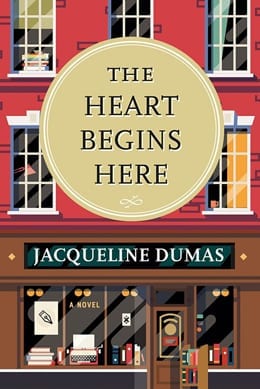

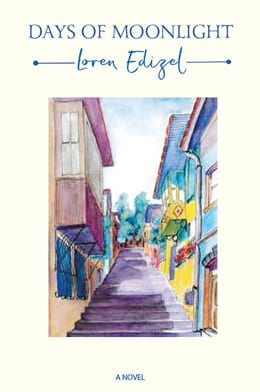

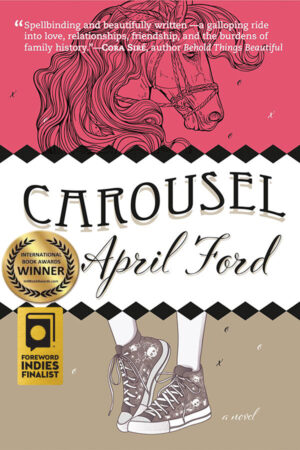
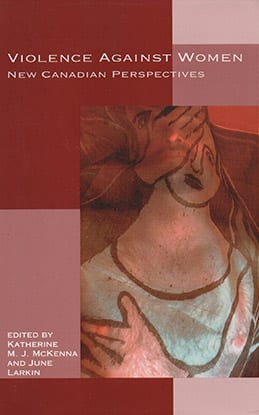
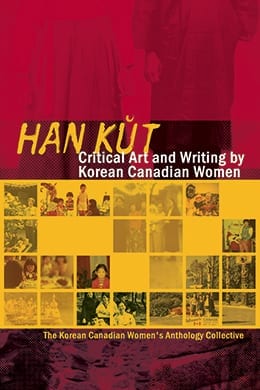
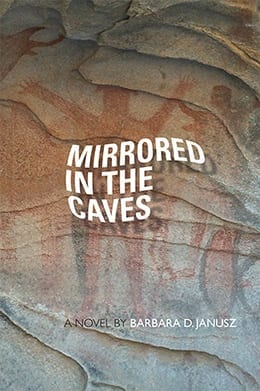
Donna Decker –
THE HEART BEGINS HERE (2018) BY Jacqueline Dumas is another book featuring a bookstore – and a feminist bookstore — something I cannot resist. At Common Reader Books, in 2001, is where we meet the quirky regulars, the giggling teenagers, and the author readings for which Sara Requier, the owner, has such high hopes. The store holds special ceremonies including one to remember the fourteen women murdered at Ecole Polytechnique in Montreal in 1989; it hosted a Women of the Left Bank night where customers dressed as their favorite writers (Djuna Barnes, Gertrude Stein, Alice B. Toklas, and James Joyce in drag!). Sara Requier is in a relationship with Wanda Wysoka. Wanda is in a relationship with a new lover, Cindy. Cindy is murdered. And bedraggled, yet optimistic, Sara is caught in a whirl of emotions: her abiding love for Wanda, her anguish at being left by Wanda, and her generous heartache for Wanda’s loss of Cindy. Meanwhile, the bookstore is struggling in the era of huge corporate bookstores and the Internet explosion. On top of that, Sara’s mother does not acknowledge Sara’s lesbianism. It may not sound like it, but this book is packed with humor and incisive social commentary. It takes up the issues of misogyny, homophobia, and loss. Though a brief novel, it is packed with much that is wise and warm.